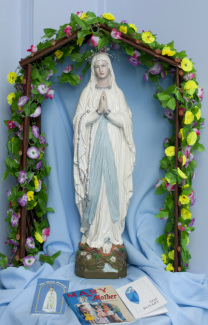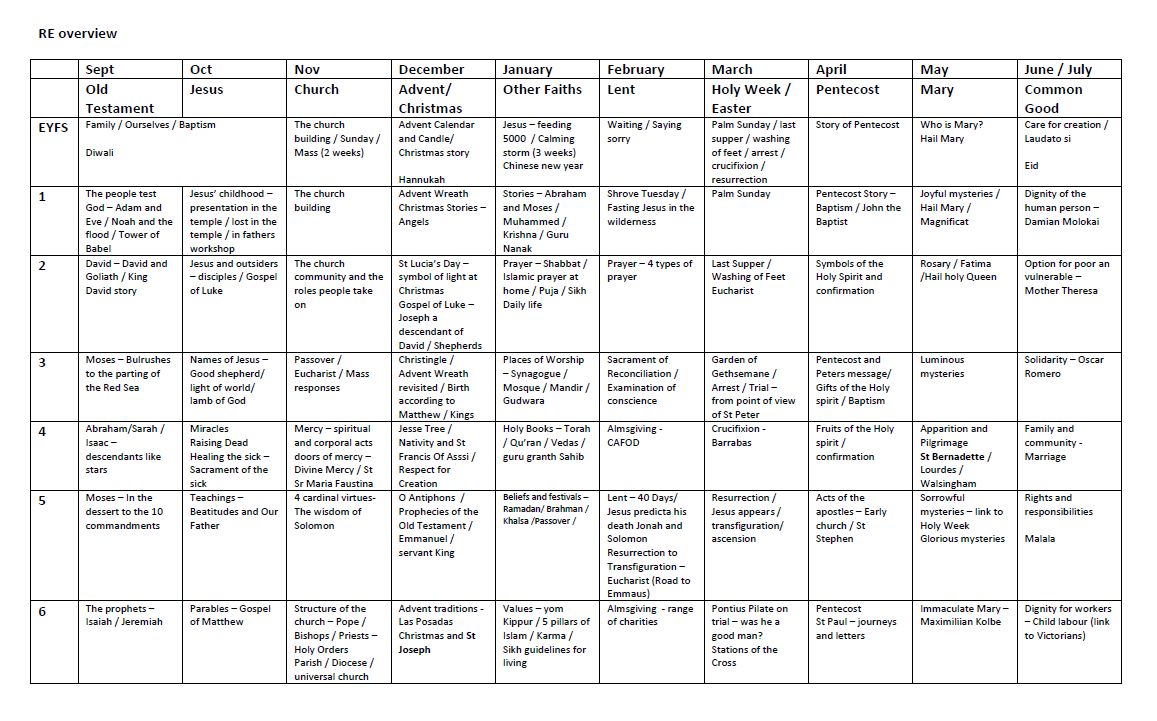Religious Education
 The aim of Religious Education at St Catherine is to:
The aim of Religious Education at St Catherine is to:
Provide outstanding teaching and learning about and from religion.
To ensure the curriculum is rooted in Gospel values, putting Christ and his teachings at the centre of what we do
To ensure that the curriculum develops children’s spiritual, moral, social and cultural understanding
To allow children to actively participate in a wide range of worship and liturgical celebrations
That the curriculum covers the teachings of the Catholic Church but also includes content on other Christian denominations and other major world faiths, in particular Judaism.
In accordance with Diocesan Requirements 10% of the teaching timetable is dedicated to Religious Education.
At St Catherine we are ensuring we meet the content requirements of the Bishops Conference Curriculum Directory by creating our own RE scheme. We also ensure that RE is assessed as rigorously as any other subject area.

Other Faiths
Each year the children also follow the other faiths programme outlined in Come and See, learning about four major world faiths, with a strong emphasis placed on Judaism. In total they spend 5 weeks covering the themes outlined in the table below. Children in Key Stage 2 also visit other places of worship which further enhances the curriculum:
Year 3 – Hindu Mandir
Year 4 – Sikh Gudwara
Year 5 – Islamic Mosque
Year 6 – Liberal Jewish Synagogue
|
Class/theme
FS - Special Days/Ritual objects Year 1 – Stories Year 2 - Prayer/Home Year 3 - Places for worship Year 4 - Holy Books Year 5 - Beliefs and Festivals Year 6 - Belonging and Values |
Spring 2 Judaism
Hanukkah Abraham and Moses Shabbat The Synagogue The Torah Pesach (Passover) Yom Kippur |
Summer 1 - Other Faiths
Islam Prayer Mats Muhammad Prayer at home The Mosque The Qur’an Ramadan and Pilgrimage The 5 Pillars |
Hinduism Diwali Krishna / Ganesh / Raksha Bandan Puja The Mandir Vedas / Bhagavad-Gita Brahman and Pilgrimage Karma and Dharma |
Sikhism Sikh Dress Guru Nanak Sikh Daily Life The Gudwara Guru Granth Sahib The Khalsa / One God Guidelines for living |
The Common Good
It is the mission of all Catholic schools that we contribute to the ‘common good’ of our community and society as a whole in response to the Church’s teaching on socilal justice. There are seven main principles of the Common Good that we touch upon at different times through the year and curriculum..
The Dignity of the Human Person
God made every single one of us. This makes us incredibly special. It doesn’t matter who we are, who our friends are, what we own, or what we look like. What matters is that we are special because we are God’s creations. This means too that we must treat others with great respect and fairness because God made them too.
We Are Called to Live as Family and Community
Jesus understood that people greatly need other people. We all need our families, friends and neighbors. He tells us that these important people can help us. Jesus says we must help them too. Doing this, we create a loving community.
Rights and Responsibilities
All of God’s people should have food, work, clothes, a home, school and medical care. These are ‘rights’: things every single person on earth must have to live. But many people do not have them. Jesus wants those who enjoy these rights to help their sisters and brothers obtain their rights. It is not enough to feel badly for others. Jesus says it is our responsibility to see that they receive their rights.
We Are Called to Stewardship
The earth and all life on it is God’s creation. We are called to take care of it because it is a holy gift from God and the only place we can live. When we make bad or thoughtless use of the earth’s resources, many people suffer. When we make poor choices about how we treat other living things (people, animals, plants) we cause life to be less than God intends. Making wise choices about the care of God’s creation is called good stewardship.
An Option for the Poor and Vulnerable
Every person needs food, water, work, housing, school, and medical care. Those who do not have these are poor. Our Church teaches that these brothers and sisters must be treated with extra respect and extra care and given what they need. Those who are not poor must share what they have with the others.
The Dignity and Rights of Workers
All persons work. There are many kinds of work. In each job, workers deserve to have safe conditions, reasonable hours, and fair wages. They deserve this because they are made by God. Our work gives us the means to live, but it can also be a chance to use the talents God gives us. Our work is our way of cooperating with God to create our world.
Solidarity
The world’s peoples are interdependent. That means we need each other if we are to live. We must work together if we are to go on living. And, when we share our lives with our sisters and brothers around the world, we will become the best we can be. Even though there are huge differences among us, we are still one family—the family of God.
Outside school children are encouraged to take part in good deeds in the community. Throughout the year we carry out a number of fundraising events for local, national and international charities, which are well supported by the whole school community. During Lent, the children are encouraged to choose the way in which they raise money, often working alongside another class.
